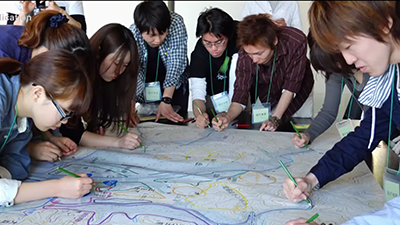What if a mobile phone app could save your life or prevent you from submerging your car on a flooded road? Technologists working through the Code for Resilience community have been developing just that sort of live-saving technology during a year-long initiative to increase the availability of locally relevant technologies that can strengthen community resilience to natural disasters.
Over 1,000 software and hardware developers participated in 11 hackathon events in nine countries: Bangladesh, Haiti, India, Indonesia, Japan, Pakistan, the Philippines, the United States, and Vietnam. Over a marathon weekend of creative brainstorming and rapid prototyping, they built tools to address a series of disaster resilience challenges that had been defined during community workshops and by the public.
The Code for Resilience activities celebrate local winners and also encouraged the coders to continue developing their ideas into mature applications over a three-month online mentoring period. At least five teams are still at work with local governments to implement and scale up these tools.
“Japan is prone to natural hazards like earthquakes and tsunamis, so we understand first-hand the importance of making communities more resilient to disasters,” said Taichi Furuhashi, lead local organizer for the Japan hackathons. “We are pleased to leverage the power of Japan’s civic hacker community to source innovative solutions to some of the greatest challenges facing our region.”
The resulting apps from these events range from support to rescuers during an emergency to a maternal health digitization tool.
A global panel of judges selected 10 finalists from more than 60 submitted apps, and three grand prize winners were chosen to present at an awards ceremony at the Understanding Risk Forum on June 30 in London. The forum is one of the world’s premiere events highlighting disaster risk management that brings together over 800 representatives from academia, multilateral organizations, government, and the private sector.
“In the lead up to emergencies, access to accurate information can mean the difference between life and death,” said Francis Ghesquiere, head of the Global Facility for Disaster Reduction and Recovery (GFDRR), one of the partners behind the Code for Resilience initiative. “Code for Resilience has enabled increased collaboration between governments and local technologists to source innovative solutions to local resilience challenges.”
The winning teams include:
Jakarta Flood Alert (from Indonesia) – This mobile app monitors 14 sluices for current water levels, change in the past six hours, and other measures. Users get the latest information about the sluices’ condition and the chances of upcoming floods in specific locations, which can be shared through social media to inform and prepare others in the area.

